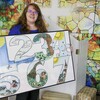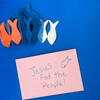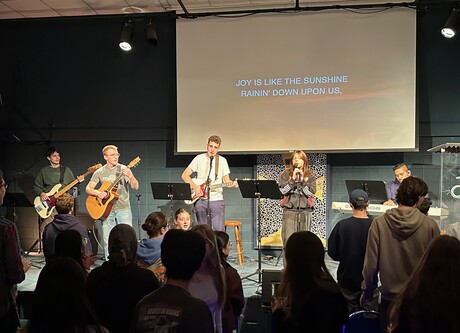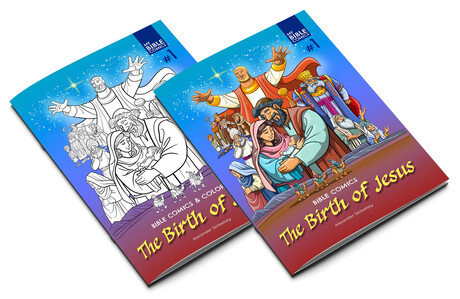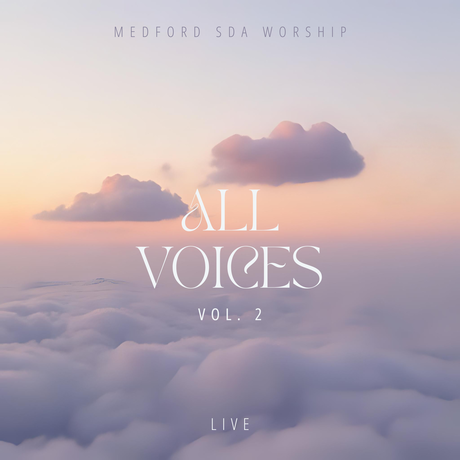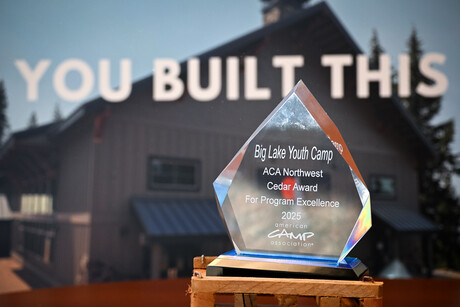If you ever visit Medford Adventist Church and go upstairs to the balcony where the cradle roll classroom is, you will likely hear the sound of a piano tinkling joyfully and a cheery voice singing a merry little welcome song. As you step inside, you will be greeted by Arlena Harmony, the person to whom the cheery voice belongs. Harmony has been a member of Medford Church for years and she is a highly valued member of the church family.
In an intergenerational church that loves music where southern gospel songs often follow contemporary praise songs in the worship set, Harmony is an influence who encourages everyone to sing along. In fact, Harmony’s passion for music reaches everyone from babies to senior members. She was a music teacher in many different schools for 28 years before retiring and opening her home for private lessons. Harmony has taught private lessons for more than 50 years and says everyone is a delight.
Allie Morse, 12-year-old Medford Church correspondent, has been taking piano lessons from Harmony since she was 7. In the last four years, Morse has not only learned piano and music theory but also how to play ukulele, how to harmonize and how to play up front comfortably. To start her time as church correspondent, Morse decided to learn more about this wonderful lady who is her music teacher and friend and to share Harmony’s ministry of music.
MORSE: Miss Harmony, how many children are you currently teaching in your music lessons?
HARMONY: This year, the Lord has given me 16 amazing students to teach in my home on Wednesdays and Thursdays. They range from 7 to 14 years old, from beginners to advanced level. We play Christian and classical music. They attend different Adventist churches in the Medford area, and many of these students share what they are learning in the music lessons with their congregations in their church services.
MORSE: Your love of music is contagious and you’ve taught me and your other 15 students to see it as a gift. You also sometimes lead praise and worship singing at church with your Sabbath School class. What exactly does music mean to you?
HARMONY: God created us with the ability to sing and make music. Music is important throughout our entire lives — singing soothing lullabies for babies, playing instruments in the school band or orchestra, singing songs in a choir concert, playing background music in a ballet performance, marching in the band in a parade or at a sporting event, hearing beautiful music as we walk down the aisle at a wedding and finally at the end of our lives during a memorial service.
Music has been called “the universal language” because it’s used and performed in every country and it can unite us in a common cause. Music is a very important part of worship and praise to God in our church services around the world. Music is mentioned many times in the Bible. In 2 Chronicles 5:13 it says, “The trumpeters and musicians joined in unison to give praise and thanks to the Lord. Accompanied by trumpets, cymbals and other instruments, the singers raised their voices in praise to the Lord and sang, 'He is good; His love endures forever.’"
MORSE: One thing we learn in our lessons is that music is meant to be shared and used to uplift other people. How do you use your musical talents to serve others?
HARMONY: God has given me the talent of music mainly to teach classroom singing, piano, guitar, ukulele, recorder, percussion, stringed instruments, choir and band students in elementary, middle and high schools. God has also blessed me with the talent to play piano in church services, Sabbath School, community talent shows and events like weddings and family reunions. I really have enjoyed playing instruments, singing with adult choirs, sharing songs with people at nursing homes and at Christmas parties, and singing songs around the campfire with my relatives. It’s so fun and rewarding to share music with other people!
MORSE: Even though many musicians begin learning at a younger age, is it ever too late to learn how to play a musical instrument?
HARMONY: No. Even older adults can learn how to play an instrument! Some of the benefits for playing an instrument at any age are:
- It can boost IQ levels and improve your brain function and concentration.
- It uses both sides of the brain, which can strengthen your memory and improve your spatial reasoning and reading skills.
- It can reduce your stress levels, lower your blood pressure and make you feel more relaxed.
- It can help you block out distractions and stay focused, which can improve your creative thinking and problem-solving skills.
- It can improve hand and eye coordination and listening skills.
- It can boost your confidence in many ways, especially when you play in a concert or for your family and church family.
- It can teach you self-discipline, patience and time management, as you play your instrument each day and have a practice schedule.
- It can teach you how to be part of a team when you play with other people.
- It can help to bring other people closer to Jesus when you play beautiful music in your church.
MORSE: I’ve certainly enjoyed learning to play different instruments. Thank you for answering my questions! Any final thoughts?
HARMONY: I look forward to singing and playing piano in church every Sabbath to worship and praise the Lord. And I look forward to someday making music with the multitude of angels, as we honor and thank the Lord for making a plan of salvation for us, so we can be with Him in Heaven.
It is never too late to learn how to praise God with music. Let’s thank Him for His gifts and love.

